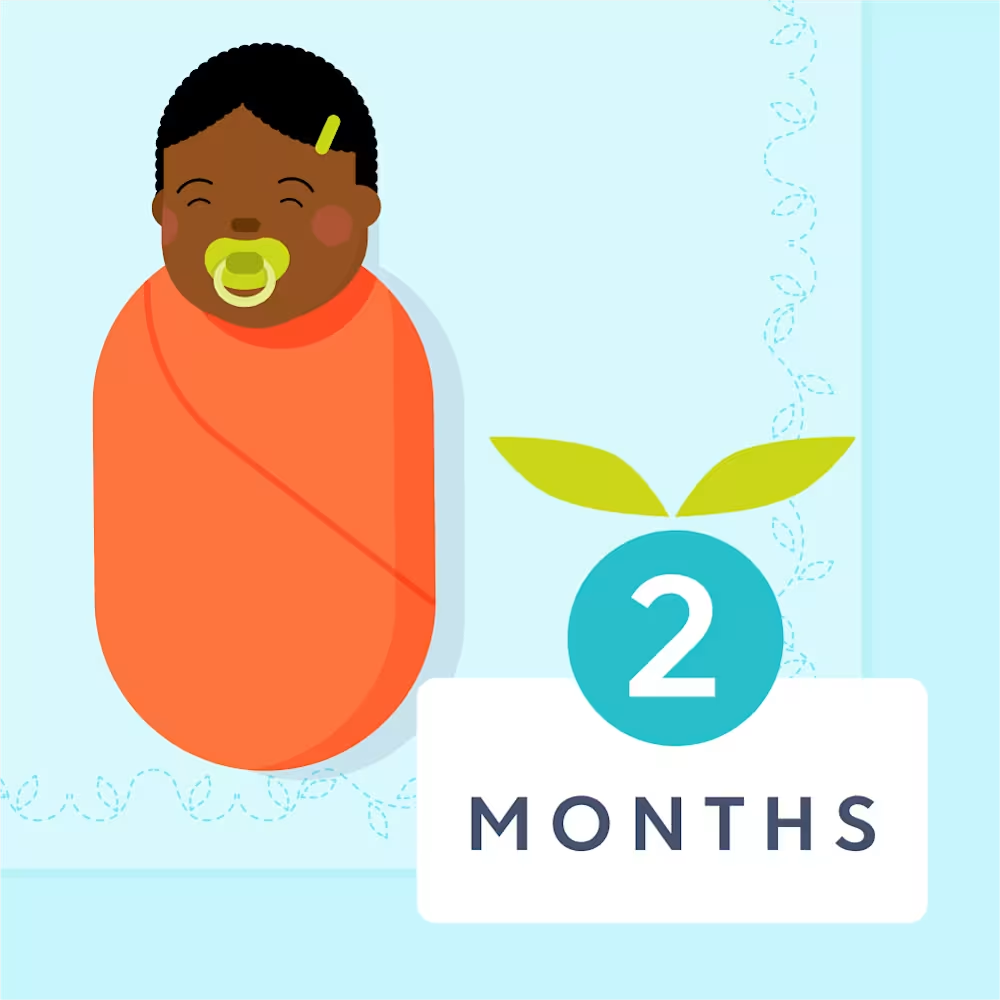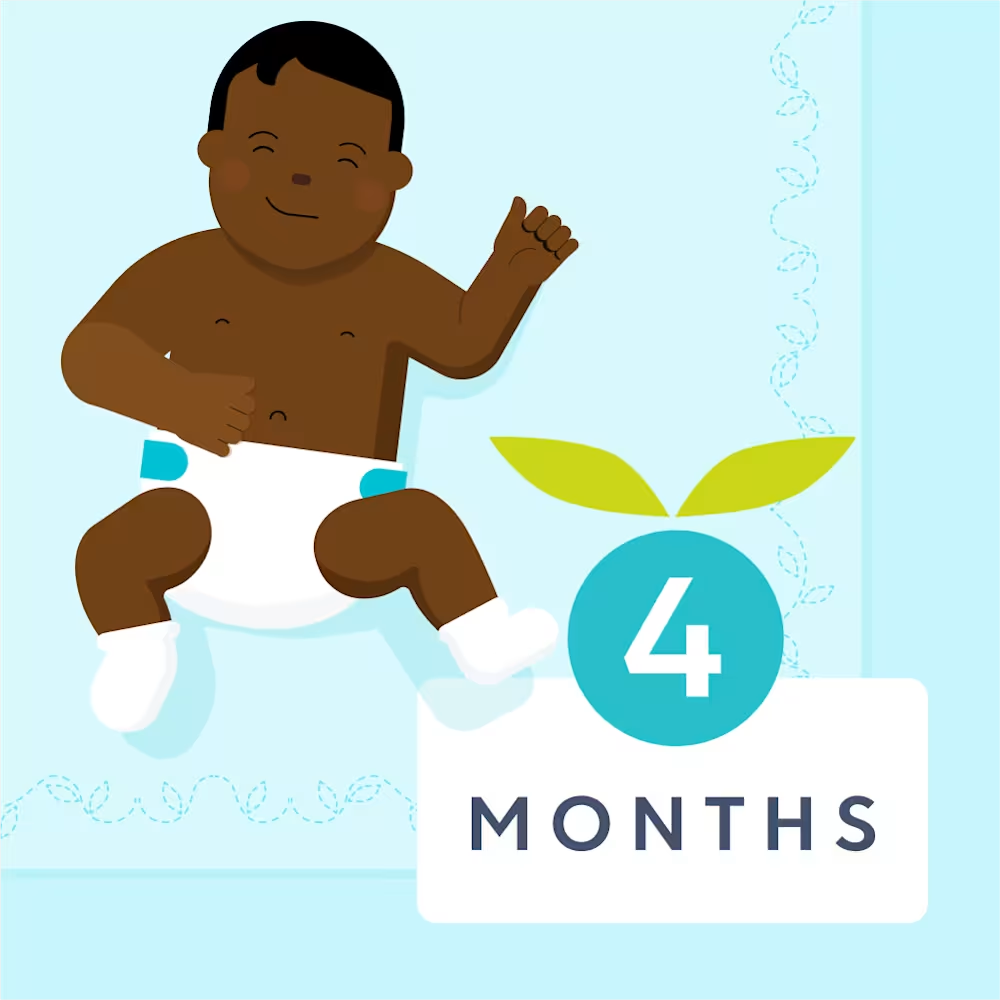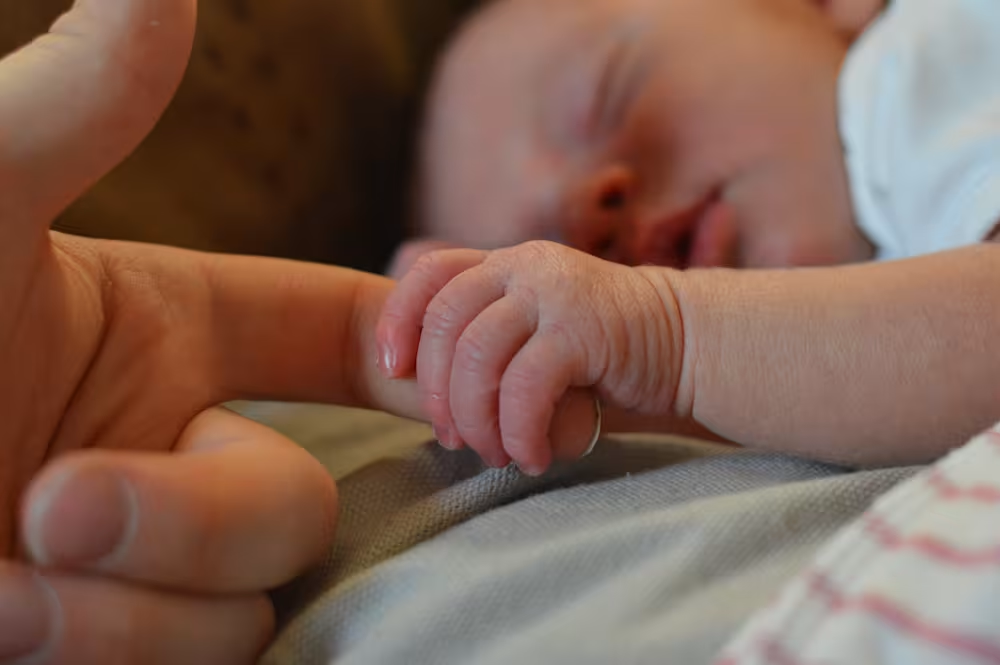3 month old sleep schedule: Bedtime and nap schedule
Updated Dec 15, 2025
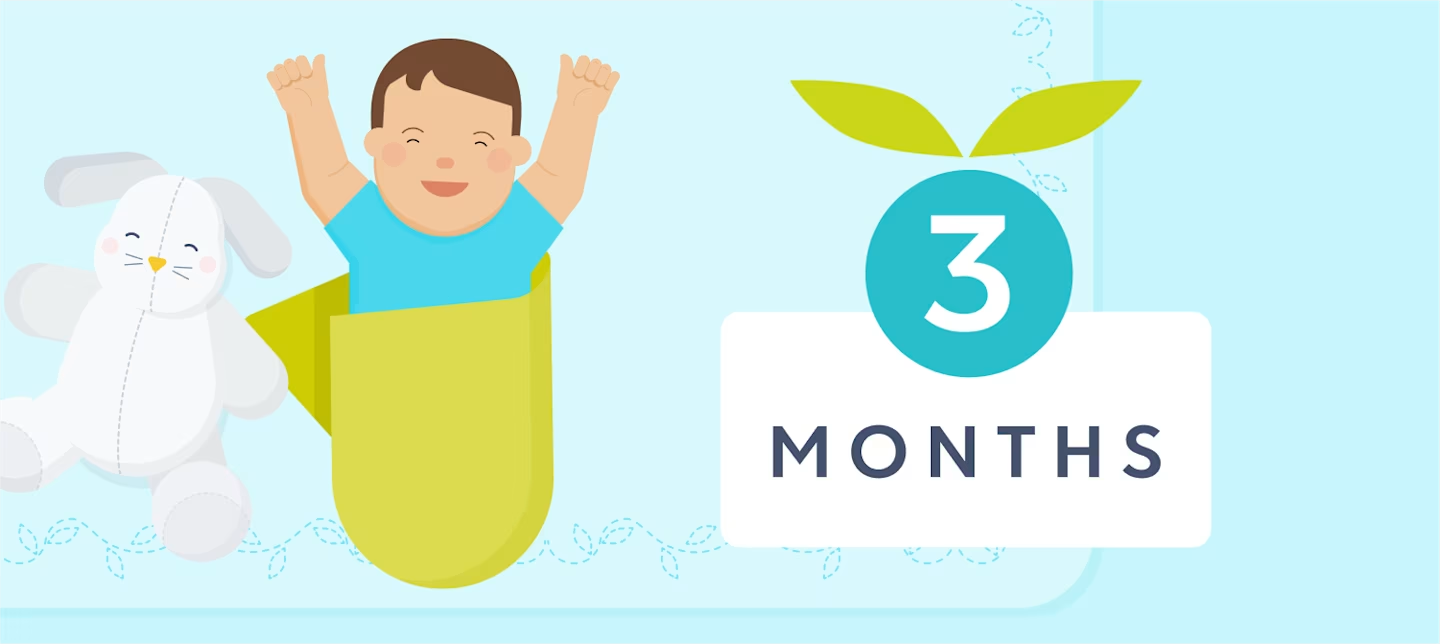
While your baby may be outgrowing newborn diapers and clothes, they’re also growing out of their newborn sleep patterns and wake windows around this time. Between 3 and 4 months, you may notice some differences in your baby’s sleep, like increased night waking and shorter naps [].
Thank the circadian rhythm (a.k.a. their internal clock) for this change; it’s undergoing a maturation process that results in additional sleep cycles for your baby, which often translates to disrupted sleep.
How much should a 3 month old sleep?
At 3 months old, babies typically need around 15 hours of total sleep in a 24-hour period []. While there’s still a lot of variation at this age, this generally breaks down into:
At least 10 hours of sleep at night
4 to 5 naps during the day
Keep in mind:
Every baby is different, and sleep needs can vary
These suggested hours are just a guide — what’s "normal" and "healthy" can differ from one baby to another
It's important to observe your baby’s mood and energy levels as key indicators of whether they’re getting enough rest
Here's a quick overview of what you may expect when it comes to 3 month olds and sleep. Note that these figures are averages and should be used as guidelines.
Why is my 3 month old sleeping a lot?
It's common for young babies to sleep a lot and there is a range of sleep needs, with some babies needing more rest than others. As your little one gets a bit older, we'd expect them to be able to stay awake for longer periods in between naps. While babies typically need more sleep during an illness, please contact your pediatrician if you have any concerns about your infant being lethargic or sleeping more than usual.
Sample 3 month old sleep schedule
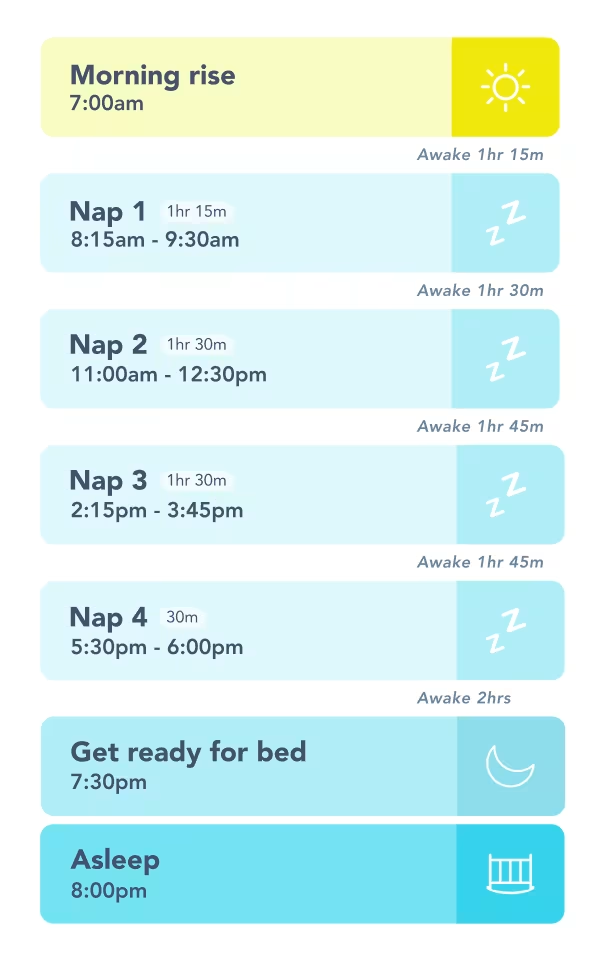
Note: Sleep needs vary by child, and this chart should be viewed as an example.
Morning rise: 7:00 AM
Wake window before first nap: 1.25 hours
First nap: 8:15 AM - 9:30 AM (1.25 hour nap)
Wake window before second nap: 1.25 hours
Second nap: 11:00 AM - 12:30 PM (1.5 hour nap)
Wake window before third nap: 1.75 hours
Third nap: 2:15 PM - 3:45 PM (1.5 minute nap)
Wake window before fourth nap: 1.75 hours
Fourth nap: 5:30 PM - 6:00 PM (30 minute nap)
Get ready for bed: 7:30 PM
Wake window before bedtime: 2 hours
Asleep: 8:00 PM
Naptime schedule for a 3 month old

How long should a 3 month old nap?
Ideally, your 3 month old will get an average of 4 - 5 hours of daytime sleep, broken up into. Short naps are still developmentally appropriate at this age, so it’s common to see some that are 30 - 45 minutes, as well as longer 1 - 2 hour naps.
How many daily naps are expected for a 3 month old?
Most 3 month olds take 4 - 5 naps per day. If your baby regularly takes longer naps, their wake windows will likely be longer too, meaning they may be comfortable with just 4 naps a day. On the other hand, if your baby only has a bunch of short catnaps all day, they may require 5 naps to make it to bedtime comfortably.
At this age, we expect babies to need a nap after 60 - 120 minutes of awake time. Continue to pay attention to your baby’s sleep cues (getting quiet/still, staring off into space, putting their head down on you) and the amount of awake time to determine the best time to nap. You can also use to take the guesswork out of finding optimal sleep times.
Check out these sample schedules, keeping in mind they’re just that — samples. Your baby’s day may look quite different, which is expected and OK!
4-nap schedule
5-nap schedule
Top sleep tip for 3 month olds
Here are some sleep tips to keep in mind for your 3 month old:
Remember that daytime naps are important. Babies this age typically need a nap after 60 - 120 minutes of awake time.
Stay flexible! While a more structured routine may be on the horizon, it’s normal for babies this age to have varying schedules.
Pay attention to sleep cues. Instead of trying to schedule naps, keep an eye out for signs your baby is tired during the day. They may get quiet or still, stare off into space, or lay their head down on you. If this is the case, try offering a nap.
It may be too early for sleep training. While it’s okay to start , it’s important to keep realistic expectations. Many babies this young still need a little help falling asleep! You can try gentle methods like gradual withdrawal or pick-up-put-down, but always consider your baby’s health and specific sleep issues before starting.
Bedtime for a 3 month old
What time should a 3 month old go to bed?
At this age, we start to see bedtimes shift earlier. The ideal bedtime for a 3 month old tends to be around 12 - 14 hours after waking for the day but no earlier than 6:00 PM. That means an optimal bedtime for a baby waking around 6:00 AM will be between 6:00 PM and 8:00 PM.
Bedtime will still depend on how many naps your baby takes and how long they can comfortably stay awake. Most 3 month olds have a wake window range that’s between 1 and 2 hours long. Babies taking fewer naps (3 - 4 per day) will generally need an earlier bedtime than babies taking 5 naps a day.
How long should a 3 month old sleep at night?
Typically, 3 month olds need between 10 - 12 hours of sleep at night, in addition to 4 - 5 hours of daytime sleep. At this age, it’s normal for babies to wake at night and need your help to fall back to sleep — whether after a feeding or a quick cuddle.
Why does my 3 month old keep waking up at night crying?
It’s common for 3 month olds to wake up overnight due to hunger. Most babies at this age still need one or more feedings throughout the night.
At 3 months, your baby may also be waking up and calling for you at night due to a biological shift in the way they sleep (often referred to as the “”). Around 3 - 4 months, infants will begin having additional cycles of light and deep sleep. They’ll begin to briefly awaken after each sleep cycle, which may lead to new sleep challenges like short naps and not being able to fall back to sleep on their own overnight.
Is there a sleep regression at 3 months old?
If your baby is experiencing a sudden, significant decline in sleep patterns around 3 months, it’s often due to the so-called “”. It refers to a biological change in how babies sleep that occurs around 3 - 4 months. Babies at this age start to have cycles of light and deep sleep due to a maturation of their circadian rhythm (aka internal clock). If they wake fully between these sleep cycles and need assistance falling back asleep or naps are suddenly shorter, we’d call this a “sleep regression.”
While frustrating, this is a sign that your little one is growing and developing. With time and some tweaks, your baby’s sleep can get back on track. If you’d like extra support in the sleep department, consider a step-by-step customized Sleep Plan via .
Can my 3 month old sleep with a pacifier?
Babies at 3 months can sleep with a pacifier. The AAP recommends [] using them during sleep times to provide comfort and reduce the risk of sudden infant death syndrome (SIDS). However, the AAP does not recommend using a pacifier to replace (or delay) breast milk or formula feedings that are vital for your baby’s growth and brain development.
Should I swaddle my 3 month old?
Some babies can continue to be swaddled at 3 months, as long as they’re not showing any signs of rolling. If your baby is trying to roll back to front or front to back (or has successfully rolled), it’s no longer safe to swaddle them [].
If this is the case, consider some like transitional swaddles and sleep sacks. These items still provide comfort like a traditional swaddle but don’t restrict a child’s arms, making them safe for sleep.
Can I sleep train a 3 month old?
Sleep training at typically has varying, unsteady results. Most babies won’t be able to consistently self-soothe throughout the night until they’re closer to 6 months old. Instead, around 3 - 4 months is a great time to have your baby practice falling asleep independently even if they probably won’t be able to do so every time.
Can a 3 month old sleep on their stomach or side?
At 3 months, the AAP continues to recommend all babies be put on their backs for sleep, per safe sleep guidelines []. Once your baby can roll both ways on their own (back to front and front to back), you can let them sleep on their stomach or side. Babies are usually working on rolling between 4 - 7 months [].
What are the developmental milestones for a 3 month old?
When your little one is working on , they may be becoming more expressive — most babies at around 12 weeks can flash social smiles and start to coo and make babbling noises. So cute! However, there’s a range of normal when it comes to baby development, so don’t fret if your little one isn’t trying all of these things just yet. However, reach out to their healthcare provider if you notice any red flags or have concerns about their growth and brain development.
Raise their head and chest while doing tummy time
Support the upper body with arms while positioned on the stomach
Stretch and kick their legs out
Grasp and bat at toys with hands
Open and shut hands
Start to coo and make babbling sounds
Social smile
Make eye contact and watch faces intently
Follow moving objects with their eyes
Does a 3 month old need to eat during the night?
While some 3 month olds may be able to sleep long stretches at night without eating, many babies continue to wake for feedings overnight. are also common around 3 months, which may lead to increased hunger and waking overnight to eat. At 6 months, it’s common for babies to still have .
If you have questions about your baby’s specific feeding requirements overnight, reach out to their pediatrician or a lactation consultant for guidance.
Takeaway
Most 3 month olds need about 15 hours of total sleep, with variations among babies. Ideally, aim for 10 hours of sleep at night and 3 - 5 naps a day.
A 3 month old ideally gets 4 - 5 hours of daytime sleep with 3 - 5 naps. Continue to plan naps according to wake windows and sleeping cues. Short naps are normal, and the number of naps depends on the length of individual naps.
Bedtime for a 3 month old is typically 12 - 14 hours after waking for the day but not earlier than 6:00 PM. Their bedtime depends on the number of naps per day and.
Navigating these changes can be challenging, but with a thoughtful approach to sleep schedules, you can support your baby's evolving sleep patterns and contribute to their overall well-being.
If you're curious about what lies ahead, glimpse into the future to see what you might experience once your baby is on a and what you may expect from over their whole first year. Also look back at and see how far your little one has come.
Share article:
Note: The content on this site is for informational purposes only and should not replace medical advice from your doctor, pediatrician, or medical professional. If you have questions or concerns, you should contact a medical professional.
8 Sources
Share article:
